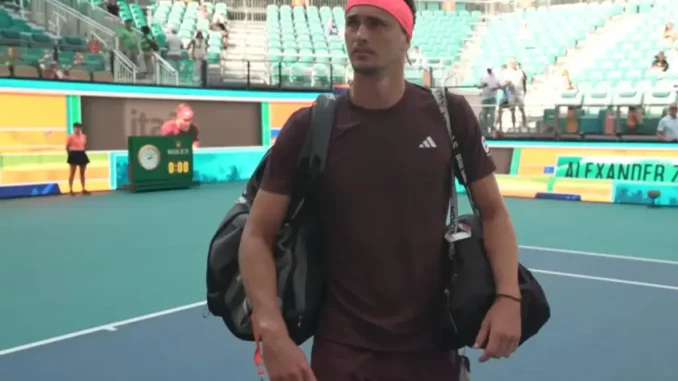
In the sun-soaked expanse of the Miami Open, Alexander Zverev stood at a crossroads, his racquet a silent witness to a season unraveling in agonizing slow motion. The German tennis star, ranked No. 2 in the world, had just suffered another gut-wrenching defeat, this time to France’s Arthur Fils in a match that slipped through his fingers like sand. The scoreline—6-4, 4-6, 6-4—told only half the story; the real narrative lay in Zverev’s candid, almost brutal self-assessment afterward. “I keep losing matches I should have won,” he confessed, his voice heavy with frustration, laying bare a truth that’s haunted him through a string of recent tournaments. For a player of his caliber, with a U.S. Open final and an Olympic gold medal already etched into his legacy, this admission was as raw as the Miami heat.
The match against Fils was a microcosm of Zverev’s 2025 struggles. He’d surged ahead, breaking serve in the third set to lead 4-3, the finish line tantalizingly close. Victory seemed assured—until it wasn’t. Fils, a 20-year-old dynamo with a fearless streak, clawed back, leveling the set and then snatching it with a decisive break. Zverev’s serve, usually a fortress, faltered at the critical moment, and his forehand betrayed him under pressure. “I’m up a break in the third, there is no reason for me to lose,” he said, dissecting the collapse with surgical precision. It wasn’t just Miami, though; the echoes of defeat reverberated from Indian Wells, where he’d served for the match against Tallon Griekspoor, and from Rio, where he’d led 4-1 in the third against Francisco Comesana, only to falter again.
Zverev’s brutal honesty peeled back the layers of a season that promised so much yet delivered heartbreak. At 27, he’s no stranger to pressure, having battled back from a devastating ankle injury in 2022 to reclaim his place among the elite. His 2024 U.S. Open run—falling to Taylor Fritz in a four-set final—proved his resilience, but 2025 has tested his mental fortitude in new ways. “In Buenos Aires, I was up a set and a break against Cerundolo,” he recalled, ticking off the litany of squandered leads. Each loss stings deeper because of the pattern: Zverev isn’t just losing—he’s losing from winning positions, a riddle he’s yet to solve. “I’m not converting the chances I’m getting,” he admitted, a rare glimpse into the psyche of a champion wrestling with his own inconsistency.
The Miami defeat wasn’t a fluke; it was a spotlight on a broader struggle. Against Fils, Zverev fired nine aces and won 77 percent of his first-serve points, stats that should have sealed the deal. Yet, his 35 unforced errors—many at pivotal moments—undid the good work. Observers noted his frustration boiling over, a clenched fist here, a muttered curse there, as the match slipped away. It’s a far cry from the Zverev who dominated the Tokyo Olympics or the one who pushed Rafael Nadal to the brink at Roland Garros. “I’m playing well enough to be in these positions,” he insisted, clinging to the belief that his game isn’t broken—just misfiring at the worst times.
For Zverev, the road ahead is as much about mentality as mechanics. The clay season looms, a surface where he’s historically thrived, offering a chance to reset. But the ghosts of these losses linger follow him, from Buenos Aires to Miami, whispering doubts as he prepares for Monte Carlo and beyond. “I’ve got to figure this out,” he said, determination flickering through the disappointment. His rivals—Sinner, Alcaraz, Djokovic—won’t wait, and the pressure to turn near-misses into triumphs is mounting. Zverev’s honesty may be brutal, but it’s also a spark, a refusal to accept defeat as his legacy. In the cauldron of competition, he’s not just fighting opponents—he’s battling himself, and that might be the toughest match of all.
Leave a Reply